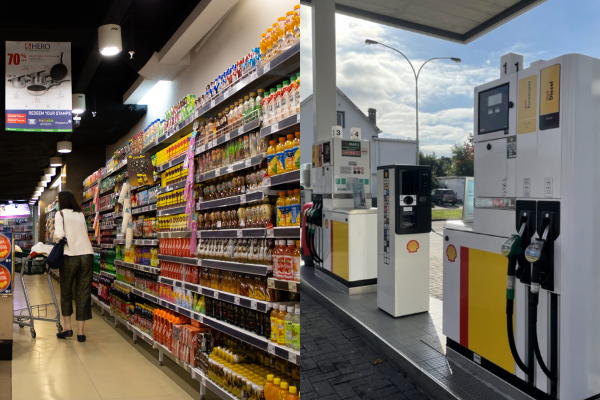As prices for diesel and petrol climb ever higher, consumer products will become more expensive, according to transport umbrella organisation Febetra.
The ongoing conflict in Ukraine has destabilised global markets; on Friday, the price of diesel (B7) rose to €2.0840 per litre, surpassing the €2 mark for the first time. As a result, transport companies are forking out much more at fuel pumps to fill up their tank than in 2021 or even at the start of this year.
"Carriers have no other option but to pass on increases in cost to their customers," Philippe Degraef, Director of Febetra, said. This essentially means products become more expensive for consumers.
Geen enkele overheidsbeslissing om de accijnzen tijdelijk te verlagen, volstaat om de reële kostenverhoging van de transporteurs te compenseren. Vervoerders hebben geen andere optie dan elke kostenstijging aan hun klanten door te rekenen. https://t.co/GP1D2wb1fI
— Philippe Degraef (@PhilippeDegraef) March 7, 2022
He added that "no government decision to reduce excise duties temporarily is sufficient to compensate" for the real cost increase. The government proposed reducing excise duty on diesel in the event of an increase in the maximum prices at the pump.
Although transport companies pay less than usual motorists to fill up their tanks since they qualify for "professional diesel" which allows them to deduct the VAT and part of the excise duties, the impact on the sector is plain to see, according to the organisations.
While some transport companies have so-called diesel clauses in their contracts with grocery chains — allowing them to adjust their prices based on fuel costs — others have annual contracts that they cannot break.
Converging problems
Alongside Febetra, transport organisations TLV and UPTR called on their members to "continue to pass on cost increases" to their clients in light of further price increases.
But Roel Dekelver, spokesperson for Delhaize, argues that it is too simplistic to say that the increase in fuel prices will directly inflate consumer shopping bills.
"The reality is that the price of fuel has been on the rise for a while, and this has indeed been included in our agreement with the transport companies, but this is incorporated in our margins to ensure prices remain competitive; this means that customers won't immediately feel the impact," he told The Brussels Times.
However, Dekelver pointed to a number of other issues that, alongside the rising fuel prices, make it difficult for shops to shield buyers from price hikes. Among these are economic uncertainty and the rising price of raw materials, purchase prices and energy prices. Together, these make for "price increases on a larger scale."
Related News
- More and more Belgians cannot pay their energy bills
- US and UK will ban Russian gas and oil
- Mustard an unlikely victim of the Ukraine conflict
Prices in Belgian supermarkets were already 3% to 5% higher in the first weeks of 2022 by comparison with the beginning of the pandemic in 2020.
"Prices today compared to a year ago are much higher due to economic context; otherwise, it would be impossible to make a profit," Dekelver said.
The Colruyt group concurred that this combination of factors has forced retailers to increase prices. "The current crisis in Ukraine-Russia will have a further effect on prices," a spokesperson told The Brussels Times.
She added that the company is following the market and will adjust prices on a daily basis to ensure that it can always "offer customers the lowest price."

